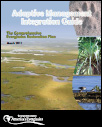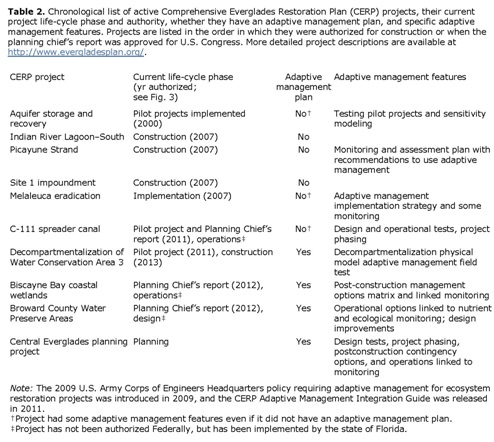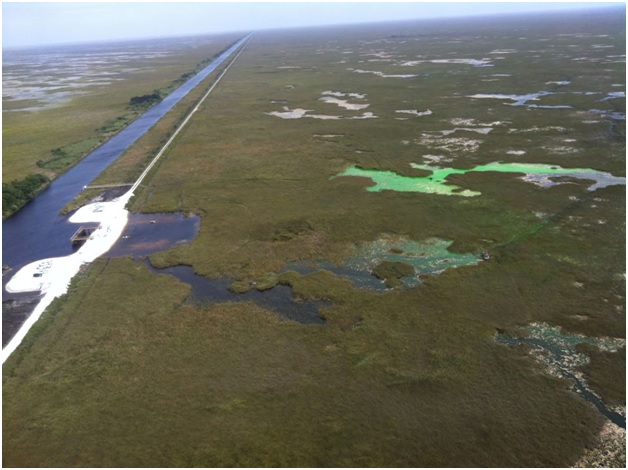
What is Adaptive Management?
Adaptive Management is a structured management approach for addressing uncertainties by testing hypotheses, linking science to decision making, and adjusting implementation, as necessary, to improve the probability of restoration success. The Comprehensive Everglades Restoration Plan (CERP) is being planned, implemented, assessed and refined using the principles of adaptive management. Founded on science, adaptive management provides an efficient process to address risk and uncertainty inherent within ecosystem restoration by encouraging flexible plans and designs. Adaptive management also encourages stakeholder engagement and interagency collaboration, which leads to common understanding of issues to be addressed by projects. When integrated into existing Comprehensive Everglades Restoration Plan (CERP or Plan) processes, adaptive management generates new information to improve the implementation of CERP through iterative refinement of project plans, designs and operations. Guidance interpreting Section 2039 of WRDA 2007 (PDF) requires that adaptive management plans be developed for all ecosystem restoration projects.
Why Use Adaptive Management?
The Water Resources Development Act of 2000 (WRDA 2000) conveyed the expectation that adaptive management principles would be applied during CERP implementation. The 2003 Programmatic Regulations specified development of an adaptive management program that includes monitoring and assessment of ecosystem restoration performance, periodic updates of CERP, and continuous improvement of the Plan. These requirements clearly recognized that adaptive management application would be very beneficial to CERP. Consistent with the U.S. Army Corps of Engineers (USACE) collaborative planning process, adaptive management encourages stakeholder engagement and interagency collaboration, which leads to a better understanding of issues that arise during implementation.
Adaptive management has great potential for improving CERP because it is scientifically based. As new scientific/technical information is learned, it is communicated to managers and decision-makers for use as the Plan is implemented. Additionally, because adaptive management promotes the incorporation of flexibility, beneficial adaptations of the Plan and/or individual components of the Plan are possible. The application of adaptive management during the planning, engineering and design phases will extend beyond those phases, and will be particularly useful as CERP enters the construction and operation phases.
Overview of the CERP Adaptive Management Program
 Draft Adaptive Management Brochure
Draft Adaptive Management Brochure
(800 kb, PDF)
CERP was authorized under the principles of adaptive management by WRDA 2000. The 2003 Programmatic Regulations for CERP required development of an Adaptive Management Program. RECOVER and CERP staff have created two documents to guide the CERP Adaptive Management Program: (1) the CERP Adaptive Management Strategy and (2) the CERP Adaptive Management Integration Guide.
(1) The CERP Adaptive Management Strategy provides a high-level framework for the application of adaptive management to Everglades restoration. The CERP Adaptive Management Strategy outlines a process for gaining better understanding of the south Florida ecosystem and incorporating new scientific and technical information to improve the Plan.
(2) The CERP Adaptive Management Integration Guide (Guide) was designed to help CERP project teams, managers, scientists, and other stakeholders understand and integrate adaptive management to make sound, collaborative decisions. The Guide is designed to be a more detailed companion document to the Adaptive Management Strategy. The Guide describes how to apply adaptive management to the CERP program and its related projects by identifying key uncertainties and incorporating adaptive management activities into existing CERP planning and implementation processes.
June 2011 - CERP Adaptive Management Integration Guide - Final
 CERP Adaptive Management Integration Guide - Final (3.7 mb, PDF)
CERP Adaptive Management Integration Guide - Final (3.7 mb, PDF)
Project Delivery Teams that need guidance to develop project-level adaptive management plans should go to Section 3 on project-level adaptive management activities and Appendix C which contains the project-level adaptive management checklist that integrates adaptive management activities into the project management schedule milestones.
Project-level AM Guidance was further defined in CERP Guidance Memorandum 56: Guidance for Integration of Adaptive Management into CERP Program and Project Management. This document provides detailed steps for integrating adaptive management activities into project implementation reports (Planning Phase). This guidance was developed to be consistent with the HQ guidance on implementing Section 2039 of WRDA 2007 on monitoring for ecosystem restoration projects. In addition, CGM 56 and the CERP AM Integration Guidance (full project-life cycle guidance) are consistent with the Adaptive management technical guidance developed for USACE nation-wide in the following publication: The Application of Adaptive Management to Ecosystem Restoration Projects (ERDC TN EMRRP-EBA-10).
A number of CERP projects have applied adaptive management principles in different ways to address key uncertainties related to their project achieving restoration success. How they have applied the adaptive management approach varies depending on when their project implementation reports were approved by USACE and authorized by Congress. The following table (LoSchiavo, et al., 2013) identifies those projects and their adaptive management features:

LoSchiavo, A. J., R. G. Best, R. E. Burns, S. Gray, M. C. Harwell, E. B. Hines, A. R. McLean, T. St. Clair, S. Traxler, and J. W. Vearil. 2013. Lessons learned from the first decade of adaptive management in comprehensive Everglades restoration. Ecology and Society 18(4): 70.
http://dx.doi.org/10.5751/ES-06065-180470
Specific project adaptive management plans are identified below:
Aquifer Storage and Recovery: Pilot project to test new technology for water storage and retrieval to address water quantity, timing and delivery issues.
C-111 Spreader Canal: First phase of project has been developed to control seepage out of Everglades National Park into Urban and Agricultural areas to the east of the L-31 levee. Adaptive management has been proposed associated with operational tests to increase stages in the project to improve seepage control to improve hydroperiods in Everglades National Park while avoid flooding of Urban and Agricultural land.
Decomp Physical Model: Field test to determine what design for decompartmentalization of water conservation area 3 is necessary to achieve sheet flow goals that promote recovery of ridge and slough landscape structure and trophic webs in Everglades ecosystem.

Decomp Physical Model Conceptual Map
Biscayne Bay Coastal Wetlands Project: AM plan intended to identify activities (e.g., operational changes, vegetation management) that may need to be implemented to ensure restoration benefits are achieved from redistribution of flows into coastal wetlands on the western side of Biscayne Bay.
Broward County Water Preserve Areas: AM plan is specific to improving operations of each impoundment area to reduce nutrients while controlling seepage out of water conservation area 3 B to improve landscape vegetation and structure and trophic hypotheses.
Central Everglades Planning Project: This AM plan was developed at the start of planning of the project and is intended to provide focused information on how to improve design and implementation of project components that will be sequenced for construction and operations overtime.
To Be Developed in the Near Future
Several presentations and publications are listed to help CERP adaptive management practitioners' development and implement adaptive management plans, as well as execute programmatic adaptive management activities to support restoration and water management efforts.
Presentations
Publications
-
Lessons Learned - LoSchiavo, A. J., R. G. Best, R. E. Burns, S. Gray, M. C. Harwell, E. B. Hines, A. R. McLean, T. St. Clair, S. Traxler, and J. W. Vearil. 2013. Lessons learned from the first decade of adaptive management in comprehensive Everglades restoration. Ecology and Society 18(4): 70.
-
Decision-Analysis - Convertino, M., C. M. Foran, J. M. Keisler, L. Scarlett, A. LoSchiavo, G. A. Kiker, & I. Linkov. 2013. Enhanced Adaptive Management: Integrating Decision Analysis, Scenario Analysis and Environmental Modeling for the Everglades. Scientific Reports 3, 2045-2322.
-
Lake Okeechobee Adaptive Protocols - Vedwan, N., Ahmad, S., Miralles-Wilhelm, F., Broad, K., Letson, D., Podesta, G. 2008. Institutional evolution in Lake Okeechobee Management in Florida: Characteristics, Impacts, and Limitations. Water Resources Management, 22(6), 699-718.
-
Adaptive Governance - Gunderson, L. and S.S. Light. 2006. Adaptive Management and Adaptive Governance in Everglades Ecosystem. Policy Science 39:323-334.
-
Socio-Ecological - Sklar, F.H., M.J. Chimney, S. Newman, P. McCormick, D. Gawlik, W. Said, J. Newman, C. Coronado, G. Crozier, M. Korvela, K. Rutchey. 2005. The ecological-societal underpinnings of Everglades restoration. Frontiers in Ecology and the Environment 3: 161-169.
Archived Adaptive Management Documents: